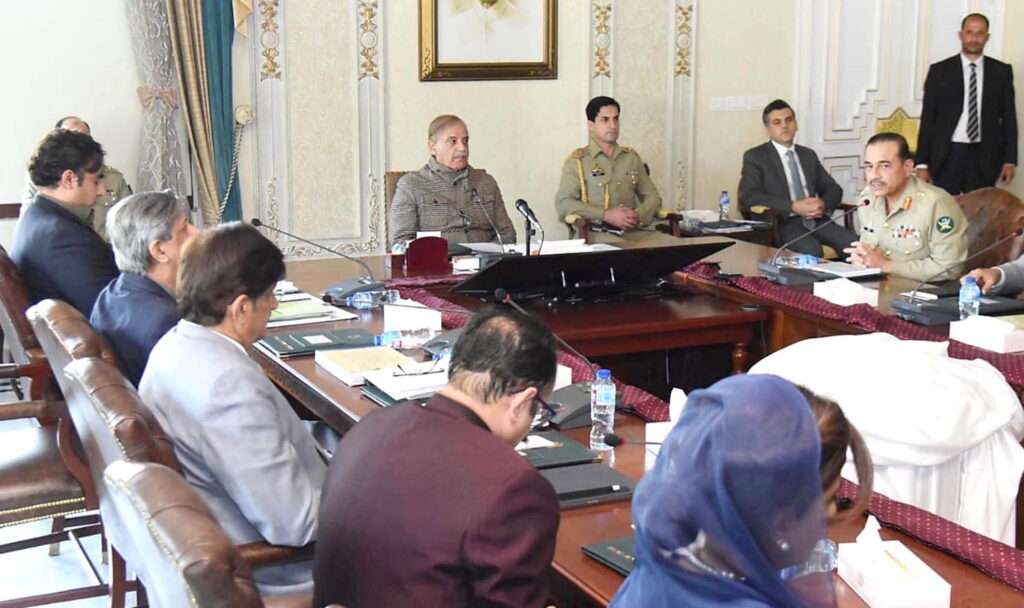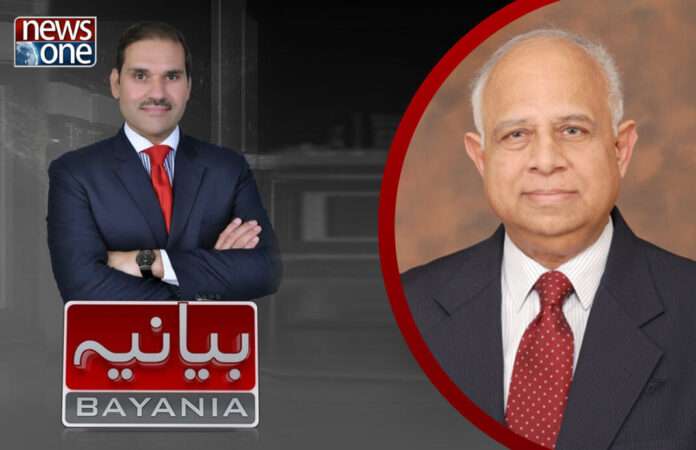Q. Waheed Hussain Anchorperson, News One
In response to the regretful incident in Peshawar, a meeting of the Apex committee chaired by Prime Minister Shehbaz Sharif was called in Peshawar. What is the national strategy, will there be another operation? Intelligence based operations are ongoing, whenever there is a terror incident, counter-terrorism operations also continue. But is there an operation like Radd-ul Fasaad or Zarb-e-Azb in the pipeline which the government is planning? An All Parties Conference has also been announced. To discuss the current situation, we have Mr. Ikram Sehgal with us. He is a writer, columnist, businessman and an expert on regional security. Thank you for giving us your time, Ikram Sehgal sb. Firstly, Prime Minister mentioned today that we will have to see the reasons as to why there were discussions on resettling Taliban in Pakistan. In an interview, former Prime Minister Imran Khan was asked about this. Do you think that the policy of reconciliation created space for them to engage in subversive activities in former FATA and KP.
Ikram Sehgal Co-Chairman, Pathfinder Group
Firstly, the talks of resettlement were initiated with those who were not involved in terror activities. There were many who were forcefully made terrorists. For example, terrorists used to enter homes and took children, killing their parents. Thus, many did not want to become terrorists but were forced to become a part of the terrorist camp. Naturally, over the years, Pakistan army initiated a program to reeducate former terrorists and sifted hardcore elements from those who were forced into it. Resettlement, in my opinion was not a bad idea. One thing I should clarify – you can never negotiate with a terrorists per se. Pakistan army, over the years, particularly through the operation launched during the tenure of General Raheel Sharif and then followed up by General Bajwa achieved numerous gains. But as chalked out in the National Action Plan, it was not followed up. We became complacent thinking that since Afghanistan issue is moving towards a solution, TTP will be controlled by the Afghan Taliban – which is far from the truth. There is a major difference between TTP and Afghan Taliban. Afghan Taliban were fighting to expel foreign forces from their land while TTP was asking for a change of ideology on this land. The objectives were different and both these entities had to be addressed differently.
Everyone engages in blame-game. I do not blame a single institution but our collective unrealistic thinking that Taliban will not repeat what they did in the past. Amongst the Taliban fighting in Afghanistan, about 30 percent had links to TTP. We did not eradicate them and we lacked the political will to take them out. Again, I will not blame a single political party or an individual but the lack of collective political will to eradicate terrorism. Let me reiterate that you cannot negotiate with terrorists.
Let us go back, you established special military courts and made a law that the convictions of these courts will not be questioned except in High Court. Peshawar High Court freed everyone. Who do you blame? Army, police, Frontier Corps fought, gave sacrifices and caught terrorists but when brought before the courts, they adopted a different attitude and ordered to free them. The judiciary is also involved in this. A single institution cannot be blamed, be it the judiciary; the establishment, the army – it all comes down to political will. Even now, we do not have a coherent policy.

Q. Waheed Hussain Anchorperson, News One
Thank you Ikram Sehgal sb. Today, the Prime Minister talked about resources. We saw that in Bannu CTD Center, 33 terrorists took hostages and were killed in an operation conducted by the special forces. PM told that 417 billion have been spent in 13 years on countering terrorism to Khyber Pakhtunkhwa and an audit should be done to determine how the funds were spent. How do you see that? Has the capacity of the counter terrorism forces decreased over the years due to which terrorist elements have reemerged?
Ikram Sehgal Co-Chairman, Pathfinder Group
When terrorism started occurring, police was not equipped. Before the police, Frontier Corps was equipped. Army was brought in and the main battles were fought by the army in the areas of Swat, but still, the actual fight was fought by FC and police. KP police has fought brilliantly, and similarly the Punjab Police. But if you catch a terrorist and bring him before a court, and the court acquits him, you do not say anything to the judiciary. I do not agree at all with the PM on his criticism. If you start criticizing, you will have to go back to when Raheel Shareef was launching an operation and Prime Minister Nawaz Sharif resisted it. He later owned it and said we did it. Leave criticism and audits, look at what can be done now. I am glad that they have invited all parties; it is yet to be seen if they will come together at the table, but we should have a forward-thinking approach. With criticism only, you wouldn’t be able to fight terrorism but will only stay engaged in political in fighting. You will need a common, coherent strategy to confront terrorism. It has to be an all-arms thing, including the police, FC, army, intelligence. Local bodies election must be done in urban centers. Unless you start local bodies elections, stakeholders would not know if any strangers have infiltrated in the area. Without local bodies elections, you will be unable to get real-time intelligence in order to counter terrorism.





